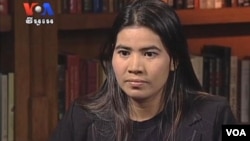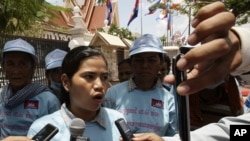Outspoken housing activist Tep Vanny says Cambodia’s struggles with forced evictions has gained international attention, hopefully leading to solutions to what has become an intractable problem for the government.
Tep Vanny is in Washington to receive a leadership award this week from Vital Voices, an organization started by Hillary Clinton in 1997.
She told VOA Khmer in a studio interview that the Cambodian government views housing and land activists as “the enemy,” when in fact they should be viewed as victims.
“We think Cambodia has no leadership or working structure or system to serve the people,” she said.
Tep Vanny, 31, was jailed alongside 12 other activists in May 2012, for leading demonstrations against evictions at a development site in Phnom Penh. She will receive the Leadership in Public Life Award from Vital Voices on Tuesday.
“We are not isolated anymore, and we have support again,” she told VOA Khmer in Washington. “I hope that this award is a sign that all of us will have a solution shortly, in coming days.”
Tep Vanny rose to prominence among the community of Boeung Kak lake following forced evictions that began there in 2008 to make room for a massive commercial and residential development project.
Some 4,000 families were eventually displaced, as the developer, Shikaku Inc., with support from local authorities, began filling the lake with sand dredged from the nearby Mekong River, displacing water and inundating homes. Many residents say they were not happy with buyouts or relocation schemes they said were inadequate.
The evictions galvanized many of the holdouts, who began public demonstrations that have led to clashes with police, arrests and criminal charges for some. One activist, Yorm Bopha, is still in jail, following her arrest seven months ago on alleged assault charges that Amnesty International has said lack credible evidence.
Tep Vanny said she hopes her Vital Voices award will put more attention on Yorm Bopha’s case and lead to solutions in the Boeung Kak conflict.
“I’ve come here first to receive the award and second to speak about our problems, asking US government officials and big US organizations to intervene,” she said. Not only do forced evictions need to end, but the court system needs reform, human rights need to be respected and Cambodia needs to be “a real democratic country,” she said.
Cambodia’s leaders “don’t look at the examples of other countries that respect democracy and human rights,” she said. “I’m disappointed that I don’t have a government that thinks about its own people, its own nation, but only has violence, arrests and the seizure of other people’s land and property.”
Demonstrations will continue, she said. “We cannot live without houses and land.”
The most pressing issues are the detention of Yorm Bopha and the failure of authorities to give proper land titles to 61 families from the Boeung Kak development, she said. Those families were supposed to be granted land on 12 hectares of the 133-hectare site, but local authorities have not done so, she said.
“What we are demanding does not mean we oppose the government,” she said. “But officials at the lower levels oppose the government. So why don’t they solve the problem? Why do they cut away 61 families and continue the violence and arrests to this day?”
The Khmer Rouge oppressed people with guns and starvation, she said. “But for this era, they don’t do that. They commit corruption under the pretext of development to mistreat us, as though to kill us alive.”





